In a groundbreaking study recently published in Food Science and Biotechnology, researchers explore the therapeutic potential of Codonopsis lanceolata peel extract as a novel intervention for premenstrual syndrome (PMS). This research offers remarkable insights into the intricate interplay between hormonal fluctuations, immune system modulation, and gut microbial dynamics, carving a new path toward understanding and treating PMS beyond conventional hormonal therapies.
Premenstrual syndrome, affecting millions worldwide, is characterized by a constellation of emotional, physical, and behavioral symptoms that emerge cyclically in the luteal phase of the menstrual cycle. Despite its high prevalence, current treatment options remain limited, often targeting symptoms rather than underlying biological mechanisms. The study spearheaded by a team including Gwon, Kim, and Jeong pioneers a multifaceted approach by investigating the biological impact of the peel extract from Codonopsis lanceolata, a traditional medicinal plant widely recognized across East Asia for its health benefits.
Utilizing state-of-the-art biochemical analyses, the researchers meticulously examined the extract’s composition, revealing a rich profile of bioactive compounds, including flavonoids, saponins, and polyphenols. These compounds are revered for their antioxidative and anti-inflammatory properties, which are hypothesized to counteract the inflammatory milieu typical of PMS. The investigation delves deeply into how these phytochemicals modulate hormonal pathways, specifically targeting the balance of estrogen and progesterone, pivotal hormones that orchestrate the menstrual cycle and influence PMS symptomatology.
The hormonal assessment detailed in the study highlights significant modulation of luteinizing hormone (LH) and follicle-stimulating hormone (FSH) levels upon administration of the Codonopsis lanceolata peel extract. These findings suggest that the extract may restore hormonal equilibrium disrupted in PMS, potentially alleviating mood swings, irritability, and other cyclical manifestations. The research methodology incorporated rigorous clinical trial protocols with placebo controls, thereby ensuring the reliability of hormonal data obtained.
Another dimension of the study involves immunological evaluations, addressing the increasingly recognized role of immune system dysfunction in PMS pathophysiology. Chronic low-grade inflammation and cytokine imbalances have been implicated in symptom severity. The Codonopsis lanceolata peel extract was shown to attenuate pro-inflammatory cytokines, such as tumor necrosis factor-alpha (TNF-α) and interleukin-6 (IL-6), while promoting anti-inflammatory cytokines, suggesting a profound immunomodulatory effect.
Beyond the hormones and immune factors, the researchers thoroughly investigated microbial dynamics within the gut, acknowledging the gut-brain axis’s critical role in modulating neurological and endocrine functions. The study employed metagenomic sequencing to analyze gut microbiota alterations following extract therapy. Notably, beneficial bacterial taxa associated with short-chain fatty acid (SCFA) production, like Lactobacillus and Bifidobacterium species, were enriched. These SCFAs are vital in regulating inflammation and neural transmission, mediating mood and behavioral changes observed in PMS.
The integrated analysis signifies that Codonopsis lanceolata peel extract exerts a synergistic effect by harmonizing hormonal flux, immune responses, and microbial ecology. This triad of interactions may underpin the extract’s efficacy in not only alleviating physical symptoms such as bloating and breast tenderness but also mitigating psychological symptoms including anxiety and depression.
Moreover, the study provides a comprehensive biochemical pathway analysis, deploying advanced molecular docking and in vitro assays that unveil how the phytoconstituents of the peel extract interact with hormone receptors and immune signaling pathways. For instance, specific saponins demonstrated high affinity binding to progesterone receptors, potentially explaining improved progesterone function and symptom relief in PMS.
In addition to laboratory findings, clinical endpoints measured in the study—such as the Premenstrual Symptoms Screening Tool (PSST) scores—underscored significant symptomatic improvements after eight weeks of treatment, with no adverse effects reported. These clinical outcomes reinforce the notion that the Codonopsis lanceolata peel extract represents a safe, natural alternative to existing pharmaceutical options, which sometimes cause undesirable side effects.
The implications of this research extend beyond PMS treatment. By elucidating the complex bioactivities of plant-derived extracts on human endocrine and immune systems along with microbiota modulation, the study broadens the horizon for botanical therapeutic applications in other hormone-related disorders and inflammatory conditions.
Importantly, the research team advocates for further large-scale, randomized controlled trials to validate these promising results and to refine dosage regimens. They also emphasize the necessity to explore the long-term safety profile and potential drug interactions, given the extract’s potent bioactive properties.
In conclusion, the pioneering work on Codonopsis lanceolata peel extract not only heralds a new era of integrative PMS treatment strategies but also exemplifies the deep interconnection between botanical compounds and human physiology. The findings ignite hope for millions of women seeking holistic remedies that honor the complexity of their biological systems without compromising efficacy or safety.
As the study gains traction in scientific and public spheres, it also invites cross-disciplinary collaborations, merging phytochemistry, clinical endocrinology, immunology, and microbiomics to unlock the vast potential of traditional medicine in modern therapeutics. This innovative approach could transform the landscape of women’s health and foster greater acceptance of plant-based medical interventions.
The synergy of hormone regulation, immune balance, and microbiome restoration unveiled by this research underscores the holistic principle that health conditions like PMS cannot be fully understood or treated in isolation. Rather, multidimensional therapeutics that embrace this complexity hold the key to more effective management and improved quality of life.
Ultimately, this publication is a testament to the growing body of evidence supporting integrative medicine and underscores the critical importance of revisiting nature’s pharmacopoeia with modern scientific rigor. Codonopsis lanceolata peel extract emerges not only as a promising ant-PMS agent but also as a symbol of the new frontier in personalized, multidimensional healthcare.
Subject of Research: Therapeutic evaluation of Codonopsis lanceolata peel extract in premenstrual syndrome, focusing on hormonal, immune, and microbial interactions.
Article Title: Therapeutic potential of Codonopsis lanceolata peel extract in premenstrual syndrome: insights into hormonal, immune, and microbial interactions.
Article References:
Gwon, H., Kim, H.J., Jeong, JW. et al. Therapeutic potential of Codonopsis lanceolata peel extract in premenstrual syndrome: insights into hormonal, immune, and microbial interactions. Food Sci Biotechnol (2025). https://doi.org/10.1007/s10068-025-02003-w
Image Credits: AI Generated




